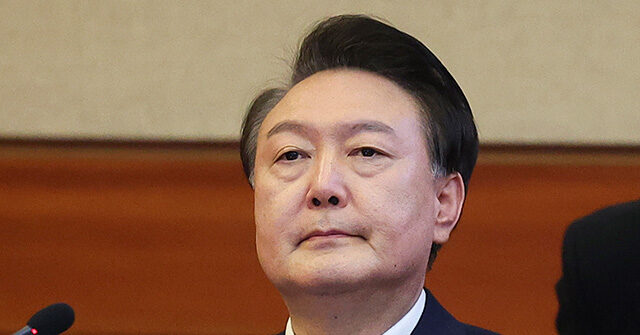South Korean President Yoon Suk-yeol made his first public appearance on Tuesday since he was arrested over the weekend in connection with his decree of martial law on December 3.
Yoon defended his actions before the Constitutional Court, which will make the final decision about removing him from office.
On Sunday, Yoon became the first sitting president in the history of South Korea to be formally placed under arrest. He had previously avoided both arrest and search warrants by hunkering down in his official residence in Seoul, which is protected by the Presidential Security Service (PSS). The PSS physically blocked officers from the Corruption Investigation Office for High-Ranking Officials (CIO) from entering the premises.
The CIO wanted to serve warrants against Yoon for treason and rebellion, the only charges that can be brought against a sitting president under South Korean law. Yoon’s martial law order was quickly overturned by the legislature, which proceeded to impeach him and nullify most of his presidential powers, but only the Constitutional Court can fully remove him from office.
The Constitutional Court became the focus of a secondary political drama, because several of its seats were empty at the time of Yoon’s impeachment. Opposition legislators impeached the first acting president to fill Yoon’s office, Han Duck-soo, because they said he was not moving quickly enough to fill the vacant Court seats.
Two of the vacant seats have since been filled under the second acting president, Choi Sang-mok, bringing the Constitutional Court up to eight justices. The opposition was exasperated with Han because six votes are needed to remove the president from office and, with only six justices empaneled, it would have been very difficult to get a unanimous vote against Yoon.
Appearing before the court on Tuesday, Yoon denied that he ordered security forces to prevent legislators from gathering at the National Assembly building on the night he declared martial law, an order that has been cited as a major factor in accusing him of rebellion.
Yoon said he sent the troops as a warning to the political opposition, which he denounced as a “den of criminals” and “shameless North Korea followers” who were sabotaging his government. He argued that legislators could have met at another location to vote on overturning his martial law order, so keeping them out of the National Assembly building would not have prevented such a vote.
Yoon also denied that he wrote a memo ordering the establishment of a replacement “emergency legislative body,” a move that would clearly indicate his intention to usurp the constitutional authority of the legislature.
Yoon’s lawyers sought to defend his martial law order on the grounds that last year’s parliamentary elections, which the opposition Democratic Party (DP) dominated, were invalid due to election fraud.
Prosecutors countered that “a prompt impeachment trial and removal of the president is the most direct path to restoring the rule of law.”
Yoon has generally refused to cooperate with investigators, although his lawyers said he chose to make a personal appearance before the Constitutional Court to explain his actions on December 3.
Yoon and several officials linked to his martial law declaration ignored a summons to appear before an investigative committee of the National Assembly on Wednesday. The committee issued seven subpoenas, but only former Army Special Warfare Command Chief Kwak Jong-geun responded.
DP Rep. Han Byung-do denounced Yoon’s snubbing of the committee as “a grave challenge and insult to the National Assembly, which represents the people.” Another DP representative, Ahn Gyu-back, said he “cannot understand how Yoon can go to some places but not others,” meaning the Constitutional Court.
Yoon’s People Power Party (PPP) stood up for him at the National Assembly, saying Yoon was right to ignore a subpoena that was “inappropriate as he is still a sitting president,” and was only meant to embarrass him.
The memo ostensibly written by Yoon to create a new emergency legislature came up at the National Assembly hearing, which was an awkward moment because the memo was supposedly addressed to Finance Minister Choi Sang-mok, who is currently the acting president.
The previous acting president, Han Duck-soo, remained prime minister even after the legislature booted him from the presidential office, and he appeared before the committee on Wednesday to testify that he never saw the controversial memo.
Also on Wednesday, the PSS denied wiping out a server connected to Yoon’s secure phone to prevent investigators from reviewing his communications. The PSS said the server erases its data automatically at scheduled intervals as a security measure.
Whatever Yoon Suk-yeol’s fate may be, it may not be decided anytime soon. The Constitutional Court has until June to make its ruling, and while it probably will not wait that long, it seems to be in no great hurry to issue a quick ruling.
Yoon has strong supporters among the South Korean public, as well as plenty of critics — in fact, his dire popularity rating increased by about ten points after the martial law debacle, according to several polls. The PPP picked up about five points during the same period, while DP lost almost all of the seven-point sympathy bump it received after Yoon’s martial law decree was overturned.
Read the full article here
